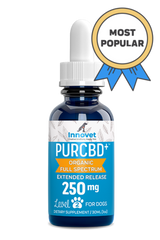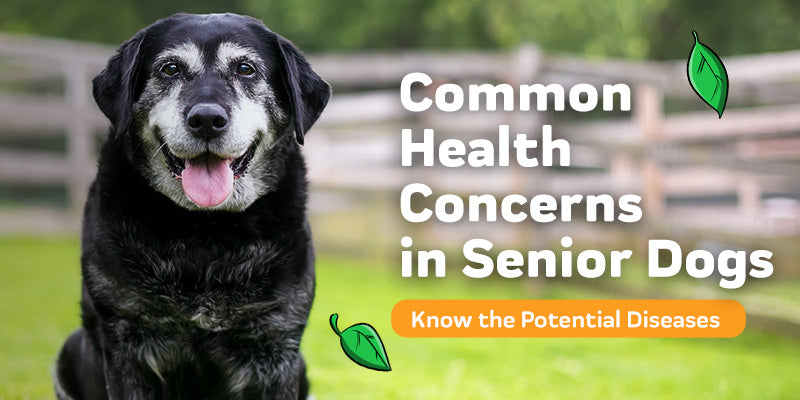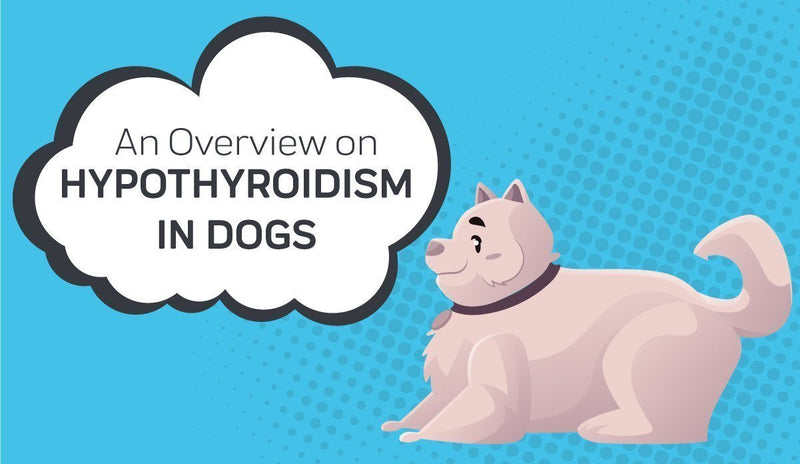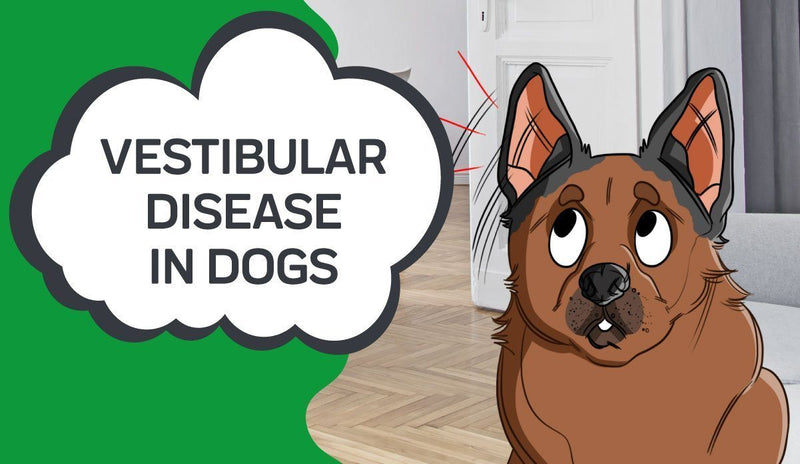Many people don't realize their dogs can get heart disease just like humans do or that there is such as a thing as a dog heart attack. This post will explain all you need to know about heart disease and congenital heart failure in dogs as well as CBD heart benefits that may make a life-saving difference for your pet.
What is Heart Disease in Dogs?
There are several conditions that fall under the category of heart disease. Coronary artery diseases that humans are more likely to get from their diet, is not a huge problem for dogs, though they can get it.
There are unfortunately plenty of other heart diseases for them to potentially get. All of these diseases are very serious, leading to diminished quality of life and the potential for heart attacks and strokes in dogs.
Most Common Types of Heart Disease in Dogs
Canine Valvular Heart Disease
Canine Valvular heart disease is a thickening and breakdown of the valves of the heart. There are valves that are between the chambers of the heart as well as leaving the ventricles. When these valves get thick and breakdown they can not close properly causing a back-flow of blood.
Heartworm
Heartworm disease comes from a dog being bitten by a mosquito carrying heartworm larvae. These nasty parasites (are there any parasites that aren't nasty), multiply in the dog's vascular system, impeding the workings of the heart and larger blood vessels.
They can grow fast and live a long time, eventually completely clogging the dog's vascular system if not treated. Treated heartworm disease can still leave permanent damage if the disease progressed far enough.
Myocardial disease
Myocardial disease is caused from the heart muscle overworking which causes thickening of the wall of the heart. This leads to a smaller chamber inside the heart for blood.
Mitral Valve Disease
Mitral Valve Disease involves the development of a weak valve between the left atrium and the left ventricle, and it usually more common in small dogs.
Canine Cardiac Arrhythmias
Canine Cardiac Arrhythmias are irregular heartbeats that come about because of a problem with the electrical impulses controlling heartbeat.
Pericardial Disease
Canine Pericardial disease involves the buildup of fluid in the sac that surrounds the heart and restricts its normal beating.
Congenital Heart Defects
There are a host of congenital heart defects as well, meaning they are inherited and being at birth though the symptoms may not appear until later.
Congestive Heart Failure
Heart disease can lead to congestive heart failure, where the heart either becomes too thick and rigid to fill properly, too weak and unsubstantial to pump properly, or the valves become so dysfunctional that they cause severe lack of blood flow.
Symptoms of Heart Disease in Dogs
Most heart diseases in dogs will cause some of the same symptoms:

- difficult breathing
- shortness of breath
- weakness
- reduction or increase in appetite
- weight loss or gain
- swollen abdomen
- lethargy
- unwillingness to exercise
- dry coughing after exercise
- dry coughing at night
- fainting
Causes of Heart Disease in Dogs?
Sometimes dogs just inherited the tendency to get heart disease. If a breeder discovers one of their dogs has an inheritable heart disease, they are supposed to stop breeding them. But dogs not bred deliberately have no such protections and even those protections for bred dogs may not be foolproof.
Heartworms cause a specific kind of heart disease and the dog gets it from being bitten by a mosquito carrying heartworm larvae.
Obesity and/or a poor diet can cause heart disease in dogs, much like it does in humans. However, obesity in dogs causing heart disease is not very common.
Certain dog breeds are more likely to develop specific heart diseases. It is important to discuss risk factors for heart disease with your licensed veterinarian.
Dogs are also just more likely to develop a heart disease as they get older. It's not guaranteed, but the risk naturally increases. You should be on the lookout for symptoms of heart disease at this point and proactive about protecting the dog's heart.
Preventing Heart Disease in Dogs

Educate yourself on your dog's breed and risk factors for heart disease. There may be particular recommendations for preventing the heart disease they are prone to.
Maintain recommended vet visits to catch heart disease early.
Do not fall prey to the fat dog is a cute dog temptation, no matter how tempting it is. Excess weight can hinder your dog's quality of life and lead to heart disease.
Be mindful of diet. Dog foods can contain too much fat. Peas, lentils, legumes, and potatoes can be found in dog foods and they can cause Myocardial disease. Grain-free dog foods may also present problems.
As you might tell from the foods already mentioned, human food should be withheld or greatly limited. You could speak to your vet about your dog's diet in relation to their individual heart health.
Choose a heartworm prevention medication or natural prevention method to keep your dog from getting heartworms.
Outlook for a Dog with Heart Disease
We'll start with the worst-case scenarios first.
Heart disease in dogs can lead to:
- heart attacks
- strokes
- muscle wasting
- severe weight loss
- difficulty breathing
- lack of appetite
- no desire or ability to play or exercise
- trouble sleeping
- vomiting
- diarrhea
- leg swelling
- limited mobility from lack of energy or severe muscle wasting
- nutritional deficiencies
- poor quality of life
- death
The positive side is that your dog can live a long and happy life with heart disease, if you catch it early and are proactive with their health.
Routine checkups and preventative measures are the safest way to protect your dog from heart disease and to catch it early.
Second to that, you want to get them to the vet at the earliest signs of a problem.
Some signs you should take your dog to the vet (aside from routine checkups):
- if a dog has a cough that lasts longer than three days
- any sign of shortness of breath or difficulty breathing
- a change in behavior
- a decrease in excitement about exercise and play
- shortened play times
- restlessness at night
- a potbelly
- decreased appetite
Diagnosing Heart Disease in Dogs
The diagnostic process may include:
- listening to symptoms
- visual inspection of dog's behavior and appearance
- listening to their heart
- x-rays
- electrocardiogram
- echocardiogram
- cardiac catheterization
- blood tests
- urine tests
Treatment Options for Heart Disease in Dogs
Diet
Diet is important for improving symptoms and outcome for a dog with heart disease and heart failure. You will need to discuss this with your licensed veterinarian because there is no one diet that helps with heart problems.
Different conditions and stages have different diet requirements. Your dog may need to reduce sodium intake, gain muscle, lose weight, correct nutrient deficiencies, add nutrients that strengthen the heart, and more.
Heartworm Treatments
Heartworm treatments consist of killing or removing the heartworms.
It is common for heartworm treatments to cause:
- loss of appetite
- lack of thirst
- dehydration
- vomiting
- fatigue
- lethargy
- incoordination
- muscle tremors
- dilated pupils
- blindness
One treatment method is surgery to remove all heartworms from the dog's heart and blood stream.
Some heartworm treatments contain arsenic and cause inflammation. No one wants to give a dog an arsenic-based medication, which is one reason why vets so strongly urge heartworm protection.
ACE-Inhibitors
When a dog's heart disease has become congestive heart failure, veterinarians typically prescribe ACE-inhibitors, or angiotensin-converting enzyme inhibitors. These treat the symptoms and lengthen the life of the dog by relaxing the blood vessels.
ACE-inhibitors can cause serious side effects:
- dizziness
- lethargy
- fainting
- vomiting
- diarrhea
- high blood pressure
- digestive ulcers
Long-term use of ACE-inhibitors and using ACE-inhibitors with other medications requires routine medical evaluation to ensure other health conditions do not occur, such as abnormally high levels of nitrogen in the blood or renal issues.
Dogs can be allergic to ACE-inhibitors. They also interact with a bunch of other medications and pregnant and lactating dogs can't use them.
Diuretics
When fluid buildup is a factor, veterinarians sometimes prescribe diuretics to reduce the buildup.
Side effects of diuretics in high quantities include:
- dehydration
- excess thirst
- decreased urination
- restlessness
- weakness
- drowsiness
- lethargy
- low blood pressure
- dizziness
- stumbling
- muscle pain
- cramps
None of these are exactly bad drugs. They can be life-savers for your dog, if the side effects or other health concerns don't make it impossible for them to take them.
Heartworm Prevention
Medicinal heartworm preventatives are controversial. Many people don't like maintaining a constant or seasonal dose of a drug in their dog just to prevent a disease, particularly when the drug can have serious and life-threatening side effects.
Side effects of heartworm prevention medications include:
But heartworms can cause permanent damage to the dog's vascular system and the treatments are at least as scary, if not often more so, than the preventatives.
If you decide medicinal heartworm preventatives are not right for your dog, discuss holistic alternatives with your vet, or seek a holistic vet. Unless your dog has virtually no chance of encountering a mosquito, some prevention is necessary.
How CBD Can Help with Heart Disease in Dogs
CBD oil is one of the most popular and natural ways to manage heart disease in dogs. It may also be used as a way to possibly ease the side effects of the traditional medications so that your dog can continue to use it.
CBD oil can help dogs with heart disease by:
- decreasing inflammation
- managing pain
- calming anxiety
- reducing the frequency and severity of seizures
- potentially protecting the heart itself from arrhythmias and infarctions
- protecting the brain from and repairing brain damage
- reducing nausea
- improving appetite
- helping them sleep
- replacing nutrients
Risks Associated with CBD Oil
CBD oil poses few concerns. There is no known instance of a CBD oil overdose. if you give a dog too much CBD oil, they may experience side effects such as sedation, loss of appetite, or diarrhea.
CBD oil does alter how the dog's liver absorbs medications, so their vet should know that they are being given CBD oil so they can dose any other medications accordingly.
The science is new regarding CBD oil, so no one is as familiar with the effectiveness or the risks as they are with traditional medications.
It makes a safe and alternative treatment for heart disease should the dog not respond to traditional medications, not being able to take traditional medications, or need relief from the side effects of traditional medications in order to continue taking them.
It is wise to keep your dog's vet abreast of your use of CBD oil to ensure it is doing for your dog what you're purchasing it for.
Using CBD Oil
The first step is to find a CBD oil product for pets.
CBD oil comes in several forms for pets to suit your needs and their tastes:
- oil tinctures
- extract concentrates
- capsules
- treats
Treats are the most fun and therefore the easiest to get in a dog. If your dog hates taking medicine, these may be the way to go. They come in both crunchy and chewy forms to suit each individual doggy's taste buds.
Oil tinctures are also pretty easy as they are often flavored and come in a convenient liquid form that can be administered by drops or sprays. Your dog may take this fine directly by mouth or you may apply it to their food.
Some tinctures are not flavored. If your dog doesn't like them, you can always add it to a food that can mask the distinctive hemp taste. Tinctures offer the greatest control for varying doses, particularly ones with droppers.
Extract concentrates are like oil tinctures except that they are just CBD oil and come out in thick little beads. You can measure the number of drops to get the dose you want. These also can be given directly by mouth or applied to food.
Capsules eliminate any taste concerns and are easy to give to dogs who are tolerant of the powder in the pills.
Dosing CBD Oil
Some CBD oil products, like capsules and treats will have a certain dose per capsule or treat stated on the product packaging. You can increase the dosage as needed by giving another capsule or treat.
Other CBD oil products tell you how much cannabidiol is in one measurement of the product, a drop, spray, or bead. You then measure out how many of these to give to reach the dose desired.
Research the suggested dose of CBD for the dog's ailment, whether it is the heart condition itself, to sleep, to improve digestion, etc. Then start with the lowest recommended dose and work up in increments to whatever achieves results for your dog.
It's important to increase gradually, otherwise you won't be able to accurately judge the effectiveness of the dose. Cannabidiol begins working immediately, but the full effects may not appear for a few weeks.
It would be needless to increase the dose before this time, unless the dog's ailment is so dire or they are in so much pain that they can't wait.
You can gradually increase their dose in as short a time as two days or use CBD oil with another treatment until the full effects can be seen.
Do be aware that very small, large, young, old, or sick dogs require different dosages. Consult a vet or our cbd dosing guide for specific dosing for the individual dog.
Purchasing CBD Oil
Before purchasing CBD oil, you'll need to know some things to look for.
Full-spectrum vs CBD isolate
When it comes to full spectrum vs CBD isolate, it's important to note their differences and what might work best for your needs. Full-spectrum CBD oil contains other cannabinoids, terpenes, and nutrients found in the hemp plant while CBD isolate is just cannabidiol. Most people actually prefer full-spectrum, attracted to the additional benefits, but some people say CBD isolate works best for their needs.
The choice of which one to start with is up to you, but if your dog has a digestive symptom, they may gain additional benefits from the nutrients in full-spectrum CBD oil.
Third-party Testing
Some CBD oil manufacturers are, tragically, not what they claim. The ones who are reputable prove this by providing third-party lab test results showing what is in their products and what is not. This way you know you're buying what you think you're buying.
Where From?
You should check the website for the CBD oil product to see where the manufacturer says they acquired their CBD oil or hemp. Some grow it themselves while others get the CBD oil from someone else. Both are okay as long as they say it was grown in a country with safe growing regulations.
Extraction
Some extraction methods are better than others, like the CO2 extraction method. Choose it. It's the safest and purest.
Ingredients
Select a CBD oil product that contains as few ingredients as possible and only ones that are necessary and safe. You should very easily be able to find natural and organic CBD oil products as well.
Innovations from Innovet
Innovet creates scientifically-backed CBD oil products for dogs and cats to treat and provide relief for hard-to-treat ailments like heart disease in dogs. We understand that hard-to-treat means there are many niches to fill and many unique pet cases to address, so if your dog can't be helped with the CBD oil products that are already on the market, let us know so we can see if we can help your dog.
Sources:
Diagnosis of Cardiovascular Disease in Dogs
The coughing dog with a heart murmur
A HEART TO HEART ABOUT YOUR PUP’S HEART
Inherited Heart Disease in the Dog
COMMON CARDIAC DISEASES IN DOGS

Sara Redding Ochoa, DVM was raised in north Louisiana. She graduated from LA Tech in 2011 with a degree in animal science. She then moved to Grenada West Indies for veterinary school. She completed her clinical year at Louisiana State University and graduated in 2015 from St. George’s University. Since veterinary school she has been working at a small animal and exotic veterinary clinic in east Texas, where she has experience treating all species that walk in the hospital. In her free time, she likes to travel with her husband Greg, bake yummy desserts and spend time with her 4-legged fur kids, a dog Ruby, a cat Oliver James “OJ”, a rabbit BamBam and a tortoise MonkeyMan.
Thanks for stopping by!
P.S. We Love You!
Sincerely,
The Innovet Team
Please do not ask for emergency or specific medical questions about your pets in the comments. Innovet Pet Products is unable to provide you with specific medical advice or counseling. A detailed physical exam, patient history, and an established veterinarian are required to provide specific medical advice. If you are worried that your pet requires emergency attention or if you have specific medical questions related to your pet’s current or chronic health conditions, please contact or visit your local/preferred veterinarian, an animal-specific poison control hotline, or your local emergency veterinary care center.
Please share your experiences and stories, your opinions and feedback about this blog, or what you've learned that you'd like to share with others.

















